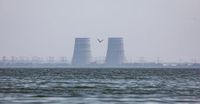During a recent call with Ukraine's President Volodymyr Zelensky, former President Donald Trump proposed a striking and controversial solution regarding Ukraine's energy infrastructure: the United States could take control of the nation’s nuclear power plants. The statement, which emerged after the call that occurred between March 17 and 21, sparked surprise and confusion among officials and energy experts in Kyiv.
The White House emphasized that American ownership would serve as a form of protection for Ukraine's energy infrastructure, enhancing support during a time of war with Russia. However, Zelensky appeared to push back against the idea, asserting during a news conference on March 20 that nuclear facilities are state-owned and thus not open to privatization.
Only one of Ukraine's four nuclear plants—Zaporizhzhia—was mentioned during the call. Currently under Russian control, this facility was at the heart of the discussion, reinforcing Zelensky's stance about the impossibility of U.S. ownership.
“If the Americans are thinking about how to find a way out of this situation... this is an open question,” he told reporters, suggesting that investment in the restoration of facilities would be more practical.
Trump is keen on having a substantial economic stake in Ukraine, consistent with his prior demands for access to Ukrainian mineral resources. Following the idea of U.S. control over the nuclear sector, this follows a pattern where he argues that American economic presence could deter Russia from further aggression.
Ukraine's aging nuclear power plants are crucial to its electricity generation, supplying approximately two-thirds of the nation's power. Despite waves of attacks that targeted other energy installations, as Ukraine faces relentless assaults amid its ongoing conflict with Russia, Moscow has largely avoided nuclear facilities due to the catastrophic potential of such strikes.
In light of the war, the Ukrainian government is also proposing to expand its nuclear capabilities, indicating an urgent need for energy security. Westinghouse, a prominent American nuclear energy firm, signed a cooperative agreement with Energoatom, the Ukrainian state-owned nuclear company, even before the full-scale invasion began, aiming to build new reactors and enhance existing technology.
Prior to the conflict, Westinghouse was already supplying fuel and technology to Ukraine, particularly for the Zaporizhzhia plant. Andrian Prokip, an energy expert, noted that the return of this facility under Ukrainian control would be advantageous for Westinghouse, emphasizing its opportunities in the burgeoning Ukrainian nuclear market.
However, the challenges of U.S. control over nuclear facilities are substantial. All nuclear plants in Ukraine, including Energoatom, are state-owned according to national law, which prohibits their privatization. Changing these laws would be complicated and likely face significant opposition across the political spectrum within Ukraine.
Victoria Voytsitska, a former member of Ukraine's parliament, remarked, “There would be great resistance to this idea in Ukraine.” She highlighted the importance of maintaining national control over key infrastructure, especially in a post-Soviet context.
Zelensky had previously pointed out that if the Zaporizhzhia plant were to be returned from Russian forces, simply transferring ownership to the United States wouldn't align with Ukrainian laws or public sentiment. Furthermore, restoring functionality to the facility after years of warfare could take as long as two and a half years according to Zelensky, posing added complications.
The reactors at Zaporizhzhia, despite being offline, still require energy for essential safety functions, creating a precarious situation amid ongoing military operations that have disrupted power lines and water supply.
During the call with Trump, Zelensky characterized their discussions as “positive steps”—a term laden with potential and uncertainty, though he cautioned that immediate results were not guaranteed.
The interplay of military operations and energy resource negotiations sets a complex stage for the future of Ukraine's nuclear plants. As the U.S. continues to explore ways to support Ukraine against Russian aggression, the debate over nuclear power and infrastructure ownership appears poised to grow in intensity.
Nonetheless, efforts to tackle these questions must be sensitive to both Ukrainian laws and the prevailing public opinion. As the situation develops, stakeholders will need to navigate the intricacies of international collaboration while upholding national sovereignty.


